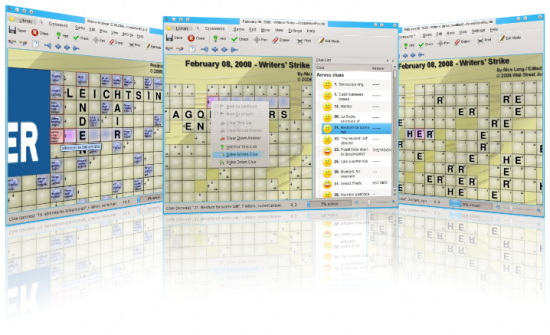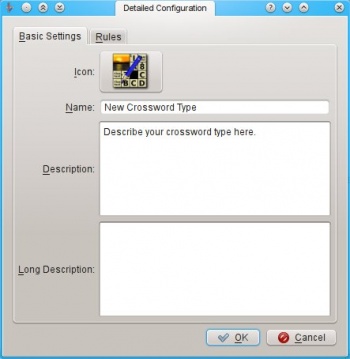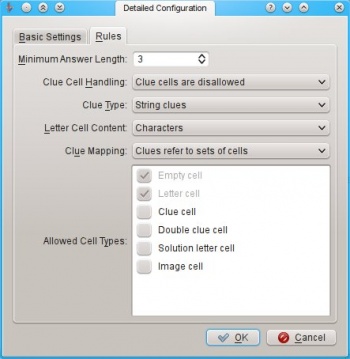KrossWordPuzzle/Crossword Types/da: Difference between revisions
Importing a new version from external source |
Importing a new version from external source |
||
| Line 5: | Line 5: | ||
[[Image:krosswordpuzzle_types_screenie.png|550px|center|thumb]] | [[Image:krosswordpuzzle_types_screenie.png|550px|center|thumb]] | ||
=== | === Amerikanske krydsogtværser === | ||
Crossword grids such as those appearing in most ''North American'' newspapers and magazines feature solid areas of white squares. Every letter is checked, and usually each answer is required to contain at least three letters. In such puzzles shaded squares are traditionally limited to about one-sixth of the design. Crossword grids elsewhere, such as in ''Britain'' and ''Australia'', have a lattice-like structure, with a higher percentage of shaded squares, leaving up to half the letters in an answer unchecked. For example, if the top row has an answer running all the way across, there will be no across answers in the second row. | Crossword grids such as those appearing in most ''North American'' newspapers and magazines feature solid areas of white squares. Every letter is checked, and usually each answer is required to contain at least three letters. In such puzzles shaded squares are traditionally limited to about one-sixth of the design. Crossword grids elsewhere, such as in ''Britain'' and ''Australia'', have a lattice-like structure, with a higher percentage of shaded squares, leaving up to half the letters in an answer unchecked. For example, if the top row has an answer running all the way across, there will be no across answers in the second row. | ||
Revision as of 09:31, 5 December 2010
Forstå opgavetyperne

Amerikanske krydsogtværser
Crossword grids such as those appearing in most North American newspapers and magazines feature solid areas of white squares. Every letter is checked, and usually each answer is required to contain at least three letters. In such puzzles shaded squares are traditionally limited to about one-sixth of the design. Crossword grids elsewhere, such as in Britain and Australia, have a lattice-like structure, with a higher percentage of shaded squares, leaving up to half the letters in an answer unchecked. For example, if the top row has an answer running all the way across, there will be no across answers in the second row.
Another tradition in puzzle design (in North America and Britain particularly) is that the grid should have 180-degree rotational symmetry, so that its pattern appears the same if the paper is turned upside down. Most puzzle designs also require that all white cells be orthogonally contiguous (that is, connected in one mass through shared sides, to form a single polyomino).
Swedish Crosswords
The Swedish-Style grid uses no clue numbers - the clues are contained in the cells which would normally be black in other countries. Arrows indicate in which direction the clues have to be answered, vertical or horizontal. This style of grid is used in several countries other than Sweden, usually in magazines with pages of A4 or similar size. The grid often has a photo of a pop or movie star replacing a block of squares, as a clue to one answer. These puzzles usually have no symmetry in the grid.
Crosswords with clue cells inside the crossword grid are also called Arrowwords, Pointers or Tipwords in English, Autodefinidos in Spanish, Mots Fléchés in French, etc.
Crossnumbers
A crossnumber (also known as a cross-figure) is the numerical analogy of a crossword, in which the solutions to the clues are numbers instead of words. Clues are usually arithmetical expressions, but can also be general knowledge clues to which the answer is a number or year. There are also numerical fill-in crosswords.
The Daily Mail Weekend magazine used to feature crossnumbers under the misnomer Number Word. This kind of puzzle should not be confused with a different puzzle that the Daily Mail refers to as Cross Number.
Number Puzzles
Number puzzles are a variant of crosswords in which each cell has a number between 1 and 26. The solver has to find out for which letter of the alphabet a number stands.
Free Crosswords
This is a special type that tries to be least restrictive. You can use all available cell types (eg. clue cells, double clue cells, image cells, solution letter cells). You can mix answers that have a clue cell with answers that don't. Answers may contain characters as well as numbers.
User Defined Crosswords
Lets you specify your own rules. TODO: Description of the rules


